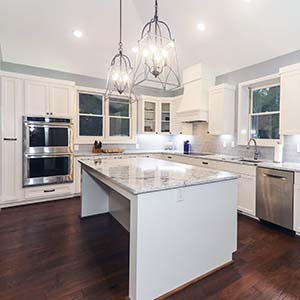
Proper planning can keep kitchen remodels from being a nightmare.
Thorough planning is key to a smooth kitchen renovation, ensuring the final result aligns with your vision. Depending on the scope, a remodel can take anywhere from a few weeks to several months. A well-prepared approach leads to a transformation you’ll enjoy for years.
Before starting, homeowners should define their goals, budget, and style preferences. Consulting a professional designer helps streamline decisions, balancing aesthetics and functionality. If structural changes or major upgrades are involved, permits may be required. Homeowners should work with contractors to secure necessary approvals before construction begins.
Each stage of a kitchen renovation comes with potential delays, so understanding the process helps set realistic expectations.
- Demolition: The first step is removing old fixtures, cabinets, and appliances to prepare for the new design. Proper preparation prevents unnecessary delays.
- Structural changes: Expanding or reconfiguring the kitchen often requires permits and inspections, which can extend the timeline.
- Plumbing & electrical work: Upgrades to accommodate new fixtures or appliances may take extra time, especially if unexpected issues arise.
- Cabinet installation: Custom cabinets take longer to manufacture and install than prefabricated options. Homeowners should account for lead times.
- Countertops & backsplash: Unique or specialty materials may have long fabrication times, causing delays, though they often enhance the final look.
- Flooring: The choice of materials and necessary preparation impact how quickly the project progresses.
- Painting & wall treatments: Selecting colors in advance prevents delays. Changing your mind mid-project can extend the timeline.
- Fixtures, appliance installation: Coordinating with multiple contractors ensures everything fits seamlessly, but any issues in this phase can delay completion.
- Final inspections: This crucial step ensures work meets building codes. Delays in scheduling can push back when your kitchen is ready for use.
There are other factors that can affect your timeline as well. A minor update, like replacing countertops, takes far less time than a full-scale renovation involving plumbing, electrical, and structural work.
With supply chain disruptions becoming more common, delays in obtaining materials can extend project timelines. Homeowners are encouraged to order materials well in advance and consider alternative options to mitigate potential delays.
Skilled professionals work efficiently, whereas inexperienced teams may face setbacks. Researching and hiring reputable contractors is essential. In addition, peak home improvement seasons can lead to longer wait times. Scheduling during off-peak months may expedite the process.
There are several things homeowners can do to make their renovation go smoothly and quickly.
A well-defined budget helps homeowners prioritize their spending and avoid unexpected costs. By allocating funds for materials, labor, and potential contingencies, homeowners can make informed decisions that align with their financial capabilities.
A functional kitchen layout enhances workflow and maximizes space. Homeowners should consider the kitchen work triangle – the stove, sink, and refrigerator – to create an efficient design.
Homeowners should choose durable, high-quality materials that suit their lifestyle and aesthetic preferences. Whether opting for granite countertops or eco-friendly cabinetry, the right choices can enhance both the kitchen’s functionality and its visual appeal.
Homeowners should clearly define their project goals to set realistic expectations.
By planning carefully and anticipating challenges, homeowners can navigate their renovation confidently, creating a beautiful and functional kitchen that stands the test of time.
Photo: courtesy Tracy Tesmer Design/Remodeling




